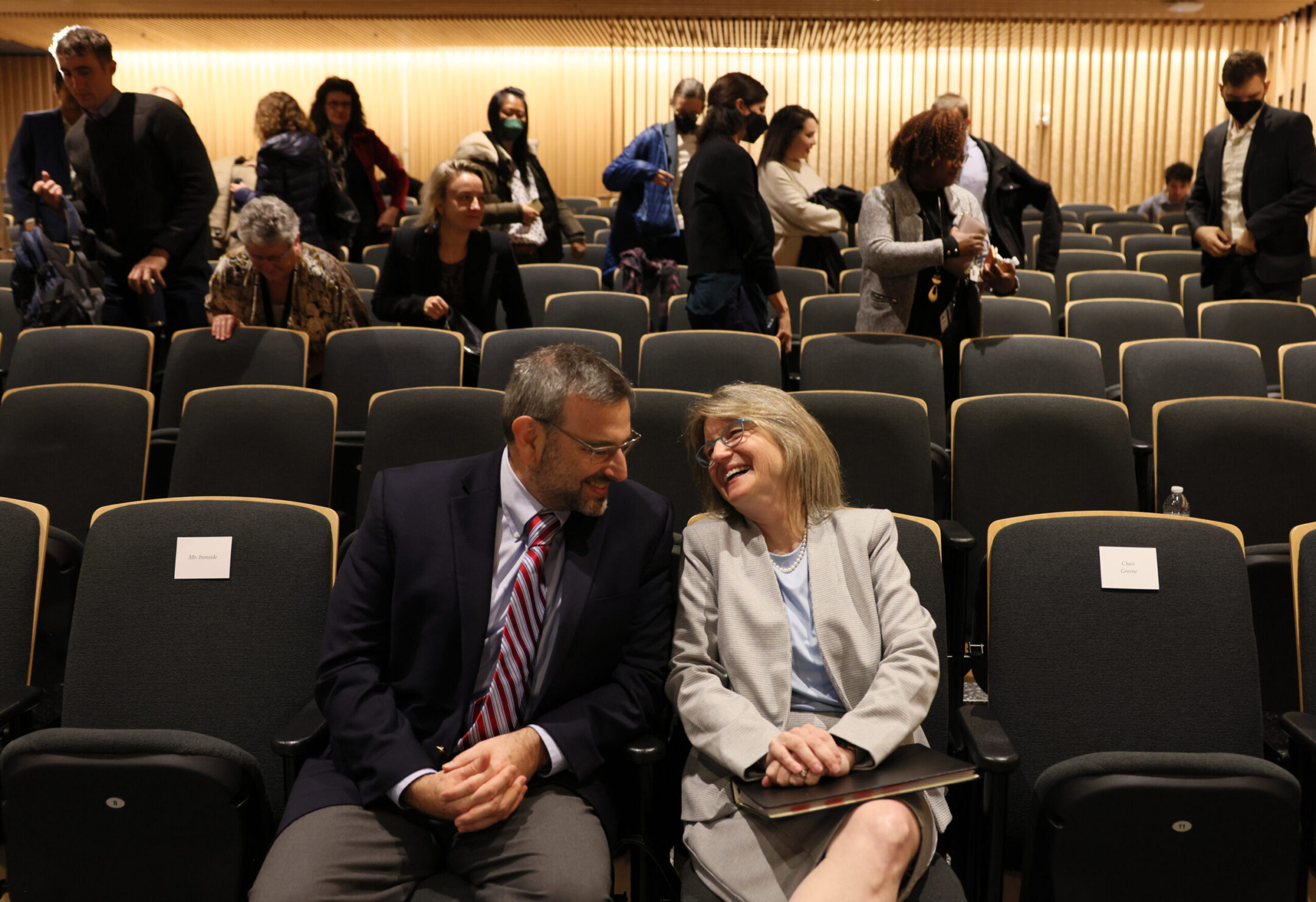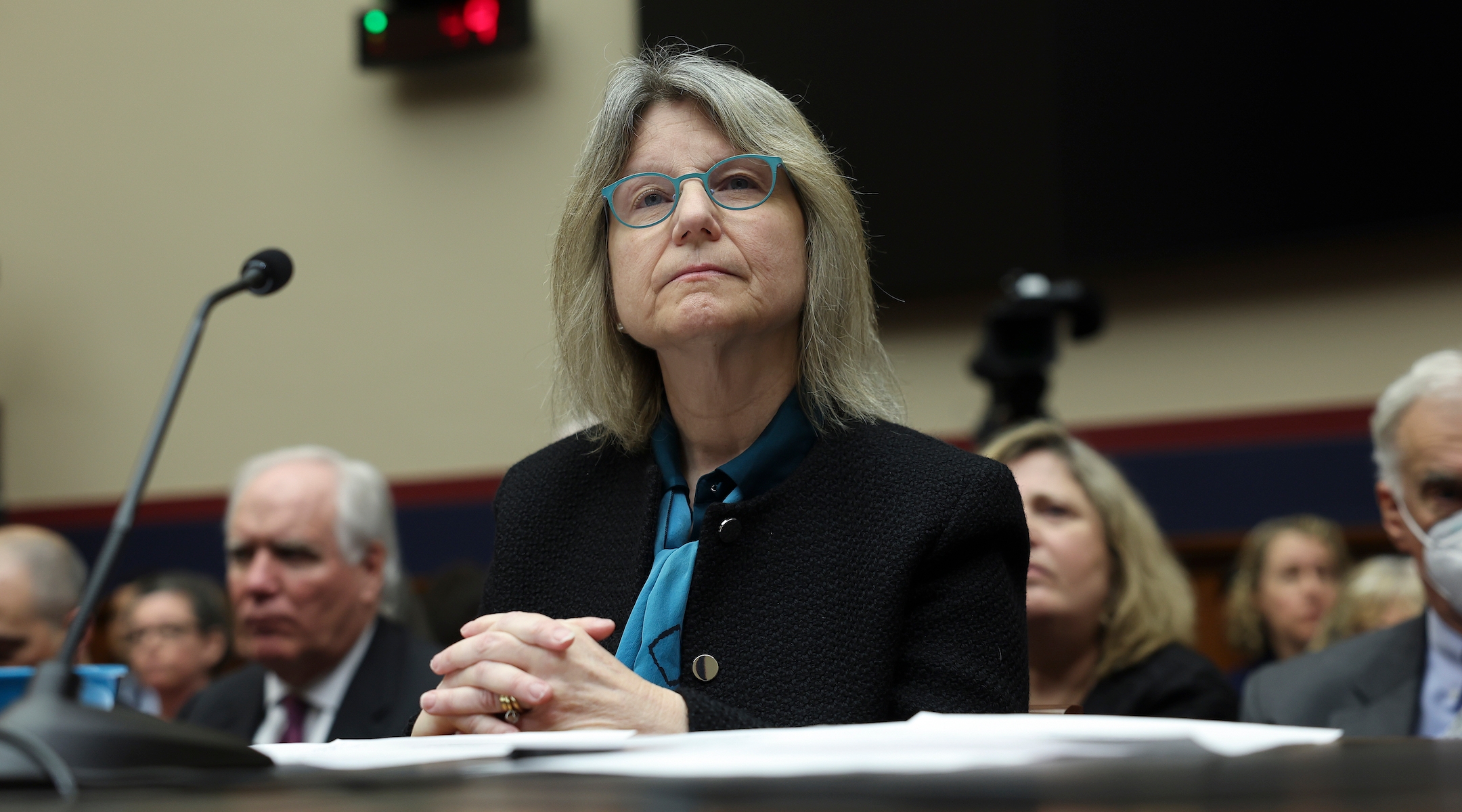((JEWISH REVIEW)) – Sally Kornbluth is different from the other university presidents with whom she has been thrust into the antisemitism spotlight.
For one thing, the president of the Massachusetts Institute of Technology still has her job. This week, Harvard University President Claudine Gay joined University of Pennsylvania President Liz Magill in resigning following their participation, alongside Kornbluth, in a disastrous congressional hearing in December.
But Kornbluth, who has headed MIT since last January, is different in other ways, too. She’s Jewish; she comes with high marks from the Jewish community at the last university where she worked; and her school was already participating in a Hillel program to fight antisemitism when Hamas attacked Israel on Oct. 7. This week, as the last of the three presidents standing, she sent a new email outlining additional steps she planned to take to address antisemitism on campus.
Now, with opposition growing in the wake of momentum from Harvard across town, the question is whether those differences will be enough to save her, and MIT’s, reputation among Jews.
“I want to be clear: Change does not necessarily mean the resignation of President Kornbluth,” Matt Handel, a 1991 MIT alum and biotech executive, told the Jewish Telegraphic Agency. Handel co-founded a new group of Jewish alumni mobilizing around the school’s handling of the current crisis.
That group, MIT Jewish Alumni Alliance, was formed in the wake of the administration’s controversial handling of an anti-Israel campus protest in November. Kornbluth had announced that students who participated in the disruptive protest would be partially suspended, citing concerns that foreign students would have their visas revoked if they received full suspensions; Jewish critics of the decision said that punishment didn’t go far enough.
The Rogers Building at the Massachusetts Institute of Technology in Cambridge, Mass., is shown on Aug. 12, 2017. (Beyond My Ken via Creative Commons)
At the Dec. 5 congressional hearing, Kornbluth, Gay and Magill all said that “calls for the genocide of Jews” did not necessarily violate university codes of conduct, depending on their “context.” Afterward, the MIT Jewish Alumni Alliance circulated an open letter criticizing the university’s handling of the issue. More than 800 people, including current MIT faculty, signed it.
Now, the group is making demands and ratcheting up pressure on the university. This week, it launched a $1 donation campaign — modeled after similar Jewish alumni campaigns at Harvard, Columbia, Penn and Stanford — to apply pressure to the school by asking donors to reduce their annual giving to that sum. And on Wednesday, Handel saw further momentum — and affirmation — when a popular MIT professor announced on social media that he was leaving the university over its handling of antisemitism.
“During a time when the Jewish and Israeli students, staff and faculty were particularly vulnerable, instead of offering the support they needed, the broader MIT community exhibited open hostility towards them,” Mauricio Karchmer, a computer scientist whose doctorate is from Hebrew University in Jerusalem, wrote on LinkedIn. “Like many other college campuses nationwide, the institute clearly failed this test.”
Karchmer continued, “Some areas of study at MIT seem to prioritize promoting a specific worldview over teaching critical thinking skills. This seems to have been institutionalized in many of MIT’s departments and programs.” (Karchmer declined to comment further to (JEWISH REVIEW).)
Yet the MIT Jewish Alumni Alliance is not advocating for Kornbluth’s resignation, even as other influential figures have called for her head, such as Jewish activist investor Bill Ackman, who lobbied for Gay’s ouster, and Republican Rep. Elise Stafanik, who grilled Kornbluth and the other presidents at the congressional hearing,.
“While there are individuals in our group who would be very happy to see her resign and really would like that to happen, as a group we have decided that we want to focus on working with the administration,” Handel said.
He instead said that the group wants Kornbluth to formally apologize for her testimony; more forcefully discipline “calls for Jewish genocide on MIT’s campus”; and “be very clear that antisemitism stands alone in this right now.”
Unlike Magill and Gay, Kornbluth did not issue an apology after testifying in Congress — though she did later attend a screening at MIT’s Chabad center of a 47-minute reel of Hamas’ atrocities, rejecting what she said was pressure for it not to be shown. (Israel’s envoy to the United Nations, Gilad Erdan, was a host of the screening and called for her resignation afterwards.)
This week, Kornbluth sent a new message to the campus community addressing antisemitism, in which she promised to improve the school’s handling of student misconduct allegations; make sure the school’s new Diversity, Equity and Inclusion director incorporates “antisemitism and Islamophobia” into their job; survey students with “targeted questions” about their experiences with antisemitism; and promote a new “shared understanding of the rights and responsibilities of free expression.”
The university’s speech conduct code was last revised in 2021 after a visiting professor compared university DEI programs to Nazi Germany in an op-ed, prompting campus outrage and the cancelation of his planned talk.
Even with her new plans, Kornbluth’s message failed, in Handel’s mind, because it also referenced Islamophobia on campus — which, he says, “hasn’t happened.”
An MIT spokesperson told (JEWISH REVIEW) that Kornbluth retains the “full and unreserved support” of the school board, and further outlined the antisemitism and Islamophobia training being planned for senior leaders on campus.
“We recognize there are a range of deeply and sincerely held views across our nearly 30,000+ on-campus community and our wider MIT family beyond campus,” Kimberly Allen wrote in an email statement, declining to comment on Karchmer’s departure.
Talia Khan, a current MIT student who is president of the MIT Israel Alliance and has been outspoken in her criticism of the university, also would not say whether she believes Kornbluth should resign.
Her group, she told (JEWISH REVIEW), is calling on the MIT Corporation — the school’s board of directors, which released a statement in support of Kornbluth days after her testimony — “to acknowledge the entrenched antisemitism” within MIT’s “senior administration and DEI infrastructure.” According to Khan, a newly initiated Department of Education Title VI civil rights investigation against MIT was also prompted by student antisemitism complaints. The probe had been shrouded in mystery, as neither the school nor the department would comment to (JEWISH REVIEW) on its origins; MIT said it has “yet to get any notice of a complaint.”
Animosity directed at Kornbluth from Jewish groups is an odd sight to Jews at Duke University, where Kornbluth worked from 1994 to 2022, including as provost. At Duke, Kornbluth was simply a beloved part of the Jewish community.

MIT President Sally Kornbluth laughs as she talks with her husband, Daniel Lew, at the conclusion of a press conference held to introduce her as MITs 18th president, Oct. 20, 2022. (Jessica Rinaldi/The Boston Globe via Getty Images)
“She was very attuned to the community here. She saw that this was her community, and we were not a prop for her,” Laura Lieber, until recently the chair of Duke’s Center for Jewish Studies, told (JEWISH REVIEW).
Kornbluth regularly participated in Jewish holiday celebrations on campus, and she and her husband donated to the local Jewish federation. At Hillel services, Lieber recalled, “the students could never quite get over the fact that the provost could just show up in a sweatshirt and jeans and just hang out with them.”
She added, “That was the Sally that I think a lot of people really miss. That’s why it’s really, especially hard to hear her commitment to Judaism questioned.”
Lieber said that, in her estimation, Kornbluth shouldn’t be judged on her congressional testimony alone. “In the wake of October 7 there was a lot of time needed just to process and to grieve,” she said, adding that Kornbluth “was not in the position to have any of that. She didn’t have any of that luxury.”
Prior to Hamas’ Oct. 7 terror attacks, Kornbluth appeared willing to proactively engage with the problem of antisemitism at MIT. The university is one of 13 members of the current cohort of Hillel International’s Campus Climate Initiative, a four-year-old program that educates university administrators on antisemitism issues. Kornbluth referenced the program during her congressional testimony — shortly before making the same heavily criticized comments as the other two presidents.
MIT’s participation in the program still counts for something, Hillel general counsel Mark Rotenberg told (JEWISH REVIEW) last month. But, he said, it doesn’t mean change will come overnight.
“The CCI program is not premised on a helicopter parent-type model where we just fly in and do something and expect the world to change that afternoon,” Rotenberg said shortly after the congressional hearing. “We’re premised on the idea that serious change takes time.”
He added, “While the CCI program does many wonderful things for Jewish students on campuses across the United States, it does not prepare presidents for testimony.”




